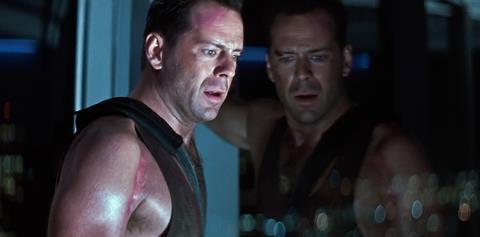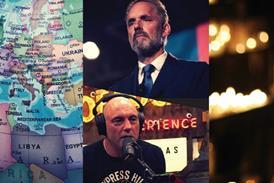C Allan says you don’t have to be a die-hard Die Hard fan to see the gospel message in this 80s action classic. The signs are everywhere.

The results are in: YouGov polled the nation and decided that Die Hard isn’t a Christmas film. If you’re outraged by that result, you likely are (or were during the 2017 poll) 25-34 years old, the only demographic who roundly disagreed.
The typical argument for agreeing with the poll goes like this: Although Die Hard is set at Christmas and has festive elements in it - a family reunion, an office party, Beethoven’s ‘Ode to Joy’, the words “ho ho ho”, etc - it’s not actually about Christmas.
But you don’t have to be a millennial, or a dedicated Die Hard fan, to see echoes of the gospel story in this quintessential American action movie. If Christmas celebrates the gift of Christ coming into the world, a rescue mission to reunite God with those he loves and the defeat of a corrupt system and the thief who reigns over it, Die Hard might just be the gospel according to John McClane.
The vulnerable hero
Let’s start at the beginning. The way we’re introduced to the film’s hero is striking: we meet him in the air. John McClane opens the film literally descending into a darkening world.
John is out of his element. He’s leaving his place of authority, stepping down from New York cop to LA civilian for the holidays, coming into a place of vulnerability. To me, this parallels God humbling himself to become human at Christmas. The film focuses constantly on the hero’s relatable humanity and fragility. Christ, particularly as a baby at Christmas, is God showing - among other things - an incredible vulnerability.
His relatability and wit is what makes us love John. At a time when action heroes looked more like jacked-up Schwarzenegger or Stallone types, John McClane is a normal, middle-aged guy who spends much of the film dodging confrontation, trying to form a team to help him and bleeding profusely. The first visual we have of him is his hand gripping an aeroplane seat, showing his fear of flying. He’s not all cool police training and zero emotion. Both Christ and McClane offer a humble hero fighting against an overwhelming, frustrating system - saviours we can identify with.
The team of disciples
From the start, John identifies with the little guy. Like Christ among so many fishermen, John is repeatedly aligned with overlooked characters. He’s not a well-heeled businessperson like those he flies in with, or like the hostages he saves. He’s unacquainted with being driven around in a limo. John puts his newbie limo driver, Argyll, at ease and sits in the front as a friend rather than in the back as a patron.
Where the law fails to save, God’s gracious gift prevails
After Argyll, the second ‘disciple’ that John enlists to help him in his mission is Officer Powell, a member of the local police force. John has reason to be coy about his identity on his covert mission. But hearing John’s coded words, Powell begins to believe that John has more authority than he lets on. Christ seems similarly evasive about declaring himself until the right time comes, and looks for his followers to lean in and discover for themselves who he really is.
Strikingly, Powell calls McClane ‘Roy’ throughout the film, referring to John’s cowboy inspiration Roy Rogers, but Roy also means ‘king’. And interestingly, John’s two disciples are black men in blue-collar roles, undervalued and rejected by the system in which they operate. Much like the fishermen, tax collectors and zealots who followed Jesus.
The thieving villain
We have our good guys, now let’s meet the villains. The main one I’ll call ‘the thief’ (Hans Gruber and co), the secondary one I’ll call ‘the law’ (the criminal justice powers who just don’t get it). John is caught between lawbreakers and the law, drawing fire from both. Any of this sound familiar? Stuck between them, the hero is viewed as an outlaw by both sides.
The thief makes a big entrance, is beautifully presented and appears to be greater than he truly is. He’s highly strategic and successfully manipulates a lot of the plot. He uses the corrupt and unsuspecting law in his favour against the outnumbered hero. But, at the end of the day, he’s just a liar who’s out to steal, kill and destroy. The thief constantly tries to identify and entrap the hero and get him to drop his guard, or to execute him. When a betrayer figure, Ellis, seeks to cut a deal with the thief, he takes the deal and executes the betrayer. Sound familiar?
The ineffectual law
The law in Die Hard presents itself as two warring factions: the Los Angeles Police Department and the FBI. (Pharisees and Saducees, anyone?) When John calls on his fellow officers of the law (who should identify with him the most), they refuse to believe him. Both factions refuse to heed John’s superior wisdom, making things worse for themselves and the hostages. The merciless FBI are happy with lose a quarter of the hostages to collateral damage and the political LAPD major on the minor things and miss what matters the most.
John McClane opens the film literally descending into a darkening world
Despite Die Hard being a cops and robbers story, the law is shown as being ultimately ineffectual to save. But where the law fails to save, both in the movie and the Bible. God’s gracious gift prevails.
The captive beloved
If Die Hard’s hostages are the unwitting, revelling world that God so loves, Holly McClane (nee Gennaro) is the Church. Holly is married to, but estranged from, the hero. There is a gap that needs to be bridged, and the hero has come to town to do just that. Interestingly, the New York Police Department motto at the time was: “Faithful unto death”. The hero shows himself to be this for his beloved, just as Christ does for the Church.
Through the story, Holly becomes more authoritative and her faith in the hero grows. Eventually, she confronts the thief and intercedes on behalf of the captives.
The details
Even some of Die Hard’s more obscure details are striking:
The Christmas story boasts two Johns: John the Baptist and John the disciple and Gospel writer. Die Hard has a love affair with the name John, referring to it multiple times: its director is John McTiernan, its hero is John McClane (whose surname, in Gaelic, literally translates as “son of the servant of Saint John.”), its villain is Hans (the German short form of Johannes or John), and its FBI agents are called Johnson and Johnson. What’s the significance of this name? In Hebrew, it means God is gracious, or God’s gracious gift - the gift that Christmas is all about.
There are two pregnant women prominently mentioned or shown in the film: Powell’s wife and Holly’s assistant. It seems odd to make a feature of this in an action plot, especially as neither of them are closely related to the hero. A possible nod to the two mums-to-be in the Christmas story, Elizabeth and Mary?
Christ starts his ministry at 30, and 30 is a significant number in Die Hard too: it’s the floor number where the action kicks off and the number of hostages taken.
Even John’s iconic vest tells a story: it starts out white and ends up a grimy, bloodied dark grey. It physically embodies sin and death - a visual nod to Christ, who knew no sin, becoming sin in the process of rescuing us. He ends the film having discarded the vest.
And then there’s the Easter eggs: look out for them on your next rewatch!
The happy ending
By the end of the film, the hero returns from death, captives are set free, the thief is thrown down, the disciples are vindicated and the beloved and the hero are reunited, back together under one name.
Looking out for biblical themes in art is an old habit of mine - and you know what they say about old habits… (See what I did there?) But whatever you watch this holidays, look out for gospel themes. They are everywhere.
Yippee-ki-yay and merry Christmas to you all!




































